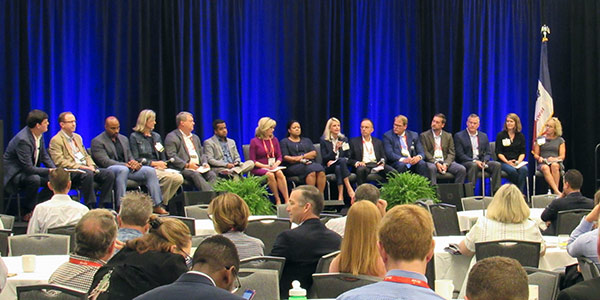By Amanda Durish Cook
DES MOINES, Iowa — The Mid-America Regulatory Conference (MARC) opened Monday with a study in local Iowa flavor and a grab bag of industry opinions gleaned from a round of questions styled after political interrogations in the spirit of state’s caucus activity.
Katie Greenstein, a chemist with Des Moines Water Works, opened the conference with a trumpet rendition of the national anthem.
“Fun fact about Iowa: We have more pigs than people,” Iowa Utilities Board Member Nick Wagner said in a welcome speech.
In lieu of speaker gifts, the event boasted corn kernel voting for four Iowa charities, similar to the Iowa State Fair’s famous polling for primary candidates. Wagner said all the charities would receive some level of donation.
Des Moines Mayor Frank Cownie regaled attendees with Saturday scenes from the fair, which not only boasted several presidential candidates but also Des Moines heavy-metal band Slipknot, along with their fan base, dubbed the “maggots.”
MARC also named Michigan Public Service Commissioner Dan Scripps its new president during the opening.
Lightning Round
With thunderstorms passing over the State Capitol, the first session of the conference was — aptly enough — a “lightning round,” in which Arkansas Public Service Commission Chairman Ted Thomas fired rapid questions at 14 industry players.
SPP General Counsel Paul Suskie fielded the first question, responding that, yes, the U.S. needs a singular energy policy, instead of a patchwork of subsidies. Suskie, a veteran of the wars in both Iraq and Afghanistan, also said national energy policy should consider the effects on other countries, referring specifically to oil impacts in the Middle East.
“I don’t know where those numbers are coming from,” Susan Williams Sloan, vice president of state affairs for the American Wind Energy Association, said in challenging an assertion by American Coalition for Clean Coal Electricity CEO Michelle Bloodworth that coal generation remains cheaper than bringing new wind resources online.
After that, Thomas jokingly asked panelists to cite research, if they could, within the time constraints.
Former FERC Commissioner Colette Honorable, now a partner with law firm Reed Smith, used her brief time to praise co-located resources — combinations of electric storage with either solar or wind generation — for its job-creating potential. However, she later noted she thought the industry was taking nuclear generation for granted for its reliability and zero-carbon attributes.
MidAmerican Energy CEO Adam Wright pointed out that his company raised rates one time in Iowa in 1999 and didn’t plan to raise rates again until about 2030, owing to steady coal and natural gas generation.
Wright also stressed the pressing need for cybersecurity, saying much of the onus was on employee vigilance because humans remain “surprisingly fallible.”
“We have employees pull an email out of the quarantine [folder] — and it’s got a warning on it — open it, say ‘OK’ to giving their passwords … and then they call the security desk to ask about [the email]. And they’re told, no, don’t do that, and the employee hangs up,” Wright said. “It’s insanity.”
He added that while it would be great if regulators greenlit cost recovery for utility cybersecurity, it remains a company responsibility to keep systems safe.
Thomas pivoted: “How about Order 1000? Is it working?”
“No,” ITC Senior Vice President Krista Tanner replied. “It’s created another level of bureaucracy and created hinderances where none existed before.”
Suskie also thought the promises of Order 1000 remain largely unfulfilled.
“We had one competitive project. … It went to the incumbent. The competitive component of competition is not working,” he said, also pointing to the litigation surrounding Texas’ recently passed right-of-first-refusal law and MISO’s Hartburg-Sabine project in that state. (See NextEra Takes Texas to Court over ROFR Law.)
When talk turned to China’s ever-increasing coal production, Honorable said the U.S. shouldn’t take that as permission to continue its own coal use.
“We can’t just say, ‘Oh they’re horrible, so we can be a little bad,’” Honorable said, adding that she was glad to see stepped-up carbon-reduction pledges from companies following the Trump administration’s withdrawal from the Paris Agreement on climate change.
Thomas wrapped up by asking panelists to make one “bold prediction” on the future.
“Bold prediction: I think utilities will be around in another 100 years,” Wright joked.
“Wind, solar and storage will assume more market share, but especially here,” Sloan said.
“Bold prediction: FERC will issue an order on FERC Halts PJM Capacity Auction.)
“Bold prediction: I think we’ll get an announcement on a new FERC commissioner by October,” Honorable said. (See FERC Could Face Months with 3 Commissioners.)
Bloodworth predicted that after 19 months with no action, FERC will finally define resilience and fuel security.
And Suskie predicted that “American ingenuity” will make the dominance of renewable generation workable.







